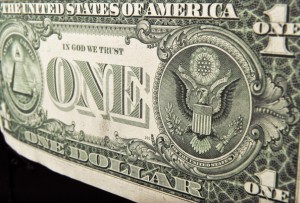In D.C., is Green the Color that Transcends All Others?

Paul J. Richards/AFP/Getty Images
Which matters more: race or class?
A new Washington Post and Kaiser Family Foundation poll shows that D.C. residents see class, not race, as the District’s biggest divider. But read past the headline and you’ll find complex intersections between race and class.
On basic quality of life issues — livability of neighborhoods and paying for food and housing — the wealth gap mattered more than the race gap. But that makes sense; if you’re earning more than $100,000, whether you’re black or white, you can afford to live and eat quite comfortably.
There are instances in which race cut across class lines. In describing how wealthy blacks and whites differed greatly in their outlooks of the economy, the Post reports:
African Americans who participated in the poll said later in interviews that they feel economic insecurity, even if they are doing well now. They also said they had friends and family members who were unemployed or in the economic doldrums…
In many cases, blacks said they felt as if their financial footing was on precarious ground, largely because they did not have a deep well of savings or because they did not have family members to fall back on.
Those with professional degrees aren’t always guaranteed a good job, but if you’re black, your chances are even worse. And then there’s racial discrimination. Such experiences can affect blacks equally regardless of income level.
Overall, the 1,342 respondents overwhelmingly said that the District is divided (76 percent), and that income (56 percent) rather than race (11 percent), separates people. But despite such sentiments, the city’s whitest ward — Ward 3 — is also its wealthiest. And the ward with the highest concentration of black residents — Ward 7 – also has the highest unemployment rate. It’s difficult to isolate race and class when faced with such stark realities.
-
Rfw716




